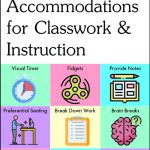Accommodations for Executive Functioning: Empowering Individuals to Thrive

Hey there, folks. Let’s talk about something that affects us all in one way or another: accommodations for executive functioning. You know, that set of skills that helps us plan, organize, and execute tasks? Yeah, those are crucial for daily life. But what if you struggle with them? That’s where accommodations for executive functioning come in – to level the playing field and help you reach your full potential.
What are Accommodations for Executive Functioning?
Before we dive into the nitty-gritty, let’s define what we mean by accommodations for executive functioning. In a nutshell, these are adjustments or modifications made to help individuals with executive functioning deficits (EFD) manage their daily lives more effectively. EFD can result from various conditions, such as Attention Deficit Hyperactivity Disorder (ADHD), autism, traumatic brain injuries, or simply being a disorganized person (no judgment here).
Identifying the Need for Accommodations
So, how do you know if you need accommodations for executive functioning? Here are some signs that might indicate you could use some extra support:
- Struggling to stay organized and manage time effectively
- Difficulty with planning, initiating, or completing tasks
- Trouble with self-regulation, leading to emotional dysregulation
- Inconsistent performance, despite having the skills and knowledge to succeed
- Feeling overwhelmed, frustrated, or anxious about daily tasks
If you identify with these signs, don’t worry – there are many accommodations for executive functioning that can help.
Types of Accommodations for Executive Functioning
The good news is that there are many types of accommodations for executive functioning available. Here are some examples:
Assistive Technology
- Text-to-speech software to help with writing and reading
- Speech-to-text software to facilitate writing and communication
- Organization apps, like Trello or Todoist, to manage tasks and projects
- Alarms and reminders on your phone or watch to stay on track
Strategies and Techniques
- Breaking down large tasks into smaller, manageable chunks
- Using a planner or calendar to stay organized and on schedule
- Creating a daily routine to establish structure and consistency
- Implementing self-regulation strategies, like deep breathing or mindfulness
Workplace and Academic Accommodations
- Extra time to complete assignments or tasks
- A quiet workspace or private office to minimize distractions
- Regular check-ins with a supervisor or mentor for support and guidance
- Modified deadlines or reduced workload to alleviate stress
Personalized Support
- Working with an executive functioning coach or therapist
- Hiring a personal assistant to help with daily tasks and organization
- Participating in support groups to connect with others who face similar challenges
How to Request Accommodations
Now that we’ve covered the types of accommodations for executive functioning available, let’s talk about how to request them. Here are some steps to follow:
- Self-advocate: If you’re aware of your executive functioning deficits, take the lead in seeking support. Explain your needs to your employer, teacher, or healthcare provider.
- Provide documentation: If you’ve been diagnosed with a condition that affects executive functioning, provide documentation to support your request for accommodations.
- Work with a professional: Collaborate with a therapist, coach, or specialist to identify the best accommodations for your specific needs.
Creating a Support System
While accommodations for executive functioning are essential, they’re only part of the equation. Building a support system can make all the difference in your ability to thrive.
- Communicate with loved ones: Share your needs and challenges with family and friends to gain their understanding and support.
- Join a community: Connect with others who face similar challenges through online forums, support groups, or social media.
- Prioritize self-care: Take care of your physical, emotional, and mental well-being to maintain your energy and resilience.
Conclusion
In conclusion, accommodations for executive functioning are a game-changer for individuals who struggle with planning, organization, time management, and self-regulation. By identifying your needs, exploring available accommodations, and building a support system, you can overcome the challenges of EFD and achieve your goals.
So, remember: you’re not alone, and there’s help available. Don’t be afraid to ask for accommodations for executive functioning – you deserve to thrive.
<